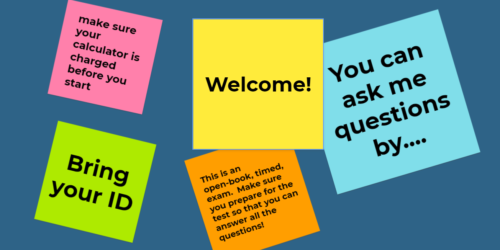
Course Completion Assessment Process for Students with Documented Disabilities
By Liz Jeffrey, Accessibility Advisor, and Elan Paulson, Teaching and Learning Consultant
The Course Completion Assessment (CCA) process is used by Accessible Learning and the academic team to support students with a documented disability who make retroactive requests.
This teaching tip explains when the CCA process is and is not applicable to students experiencing disruptions during the semester. Note that this page may be revised to reflect updates. This tip applies to all modes of class delivery.
Students Registered with Accessible Learning
What is the goal of the CCA?
CCA is a new process by which students with a documented disability may access retroactive accommodations in rare circumstances where they are needed due to an unexpected absence. The CCA process provides an opportunity for the meaningful consideration of retroactive student requests.
What is a retroactive accommodation?
An accommodation not requested in advance, but one to which the student is still entitled on the basis of a documented condition. The request for retroactive accommodation usually applies to course activities that have passed but for which the student still wishes to obtain marks. For example, a student may have unexpectedly missed an exam, and a documented accommodation after the exam allows for a retroactive accommodation for the student to take the exam at a later date.
To which students does the Course Completion Assessment (CCA) process apply?
The CCA process applies only to students with a documented disability who, in rare instances, may experience disruptions in the semester.
There are many conditions that may lead to disruption or an unplanned absence, including medical conditions, e.g., cancer, concussion, and ulcerative colitis; and mental health conditions, e.g., depression, anxiety, PTSD. The process helps to uncover what disallowed the student from coming forward.
Who is involved in completing the CCA form?
The CCA form is completed by an academic team for a student with a documented disability who has missed a significant number of classes and has provided additional documentation for this absence.
On the form, each faculty member indicates the student’s standing in their course as well as suggestions around which outstanding course work and evaluations are feasible and reasonable for the student to achieve given their academic performance and standing.
How is the CCA process normally activated? Is it activated by faculty?
The process is activated by Accessible Learning, not by a faculty member.
- Students with a documented disability who have fallen behind significantly in the semester are expected to connect with Accessible Learning either independently or based on a faculty referral.
- Accessible Learning will evaluate the student’s eligibility for this assessment.
- While the student is securing appropriate documentation, they will be encouraged to connect with you directly to continue submitting course work as appropriate.
- Once Accessible Learning confirms the nature and duration of the student’s prolonged absence, the CCA form will be sent to you by your chair or designate.
While the process is not activated by faculty, you will complete the portion of the form that applies to the course and return it to the Chair or designate within three business days.
What if I see a struggling student who I know has an accommodation (based on documented disabilities), and I have not received a CCA form?
Feel free to tell the student that this process is available. Faculty who are supporting a student with a documented disability may also reach out directly to the Accessible Learning Advisor.
Is it really okay for me to fill in the CAA and share assessment information about a student with other people?
This is a good question. We always want to be cognizant about maintaining student privacy relating to progress and performance. However, we are able to share this information when it pertains to our duties. We are also responsible for ensuring that the information is not shared beyond the immediate work group.
What are the benefits of the CCA process for faculty?
The new process involves the academic team immediately following the accommodation approval. We hope this will reduce the response effort required by faculty and ensures the student is provided with an achievable plan.
When I fill out this form, what alternate assessment tasks could I suggest?
Faculty are the experts in the course content and can modify and alter tasks, given the missed work. Students need to demonstrate knowledge, skills, and attitudes to show they have achieved the course learning outcomes, and evidence of their abilities can be collected in many different ways. Examples of modified/alternate tasks can include the following:
- Reconfigure a group assignment so that it can be completed individually
- Combine multiple assignments together into one
- Provide an alternate format for the assessment e.g., write a report instead of giving a presentation
Can a student request a CCA process if they do not have a documented disability?
Students are welcome at any point to reach out to Accessible Learning if they need support based on a disability. If students don’t know that they have a disability but they think they might, students should contact a Student Services Advisor (SSA), who will connect them with Accessible Learning.
Students Not Registered with Accessible Learning
Are short-term absences processed through Accessible Learning?
No, short-term absences due to unexpected circumstances–such as a brief illness or personal conflicts or challenges–do not normally go through Accessibility Learning.
What is the process for a student who suddenly falls ill during the semester (e.g., COVID-19, shingles, or another condition)?
Students could be struggling for a variety of reasons not related to a disability.
In these cases, students should contact a Student Success Advisor (SSA) embedded in the school or program to explore options directly with the academic team. Students can explore campus supports and services, and the self-referral process, through the Student Access Portal. Faculty can also refer a student to Student Success Advisors via the Faculty Referral Form.
Students may be advised to submit what academic teams consider to be appropriate documentation for verification.
Your program team may wish to use the CCA form internally to determine how to support the student in completing the semester. In cases of temporary health and other short-term issues (e.g., caregiving, unexpected return home), the form will not be submitted to Student Success Services.






